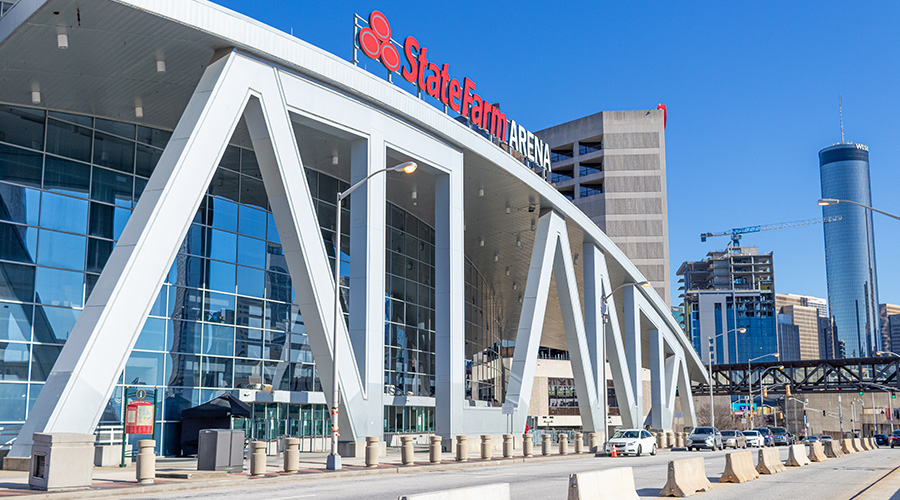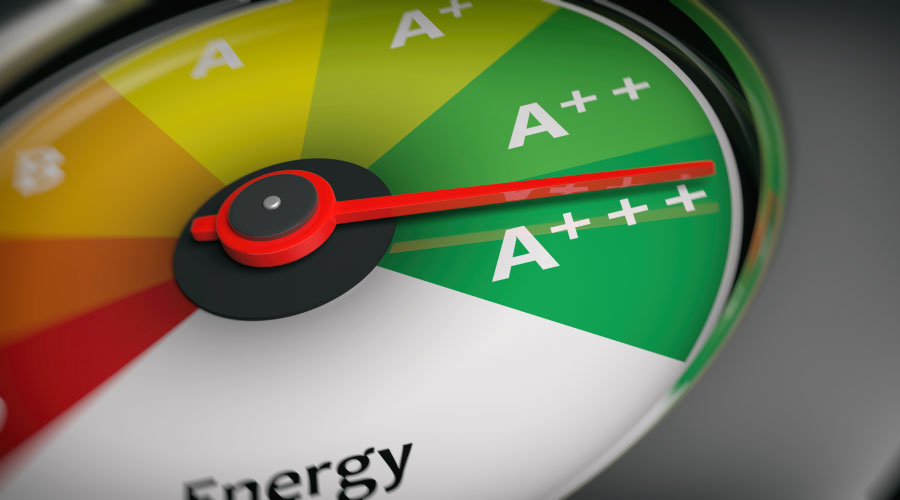Renovations Boost NBA’s Hawks’ Stadium
State Farm Arena upgrades boost energy efficiency and sustainability efforts.
By Maura Keller, Contributing Writer
Anyone who has looked at Google Maps can tell you the monumental role stadiums and sports arenas play in a city’s landscape. Like beacons or behemoths, these large structures can be seen from miles above the earth. Not only do they house professional sports teams, but they also provide a backdrop for entertainment options aplenty — revitalizing communities and neighborhoods at large.
As a result, fans fill large stadiums and arenas, often to capacity. And while many of these arenas are multi-million dollar, state-of-the-art, energy-efficient structures, others have reached their prime and need upgrades and renovations. The 17,000-seat State Farm Arena, home to the NBA’s Atlanta Hawks, is one such stadium –undergoing impressive renovations and upgrades and catapulting the stadium to be one of the most sustainable, energy-efficient and high-tech sports facilities in the nation.
LEED milestone
Back in 2009, State Farm Arena, which was originally built in 1999, was one of the first NBA arenas to earn LEED Certification for Existing Buildings: Operations and Maintenance. Recently, the arena underwent a major interior renovation that provides many benefits to athletes, fans, and facility personnel.
According to Geoffrey Stiles, senior vice president of facilities and events at the Atlanta Hawks and State Farm Arena, the facility earned the initial LEED certification in 2009, followed by the second largest renovation in the history of the NBA in 2018, leading to the receipt of LEED Gold certification.
“The most recent renovation, completed in 2018 was completed in three different phases,” Stiles says. “But the bulk of the construction work was completed in 2018 with the intention of improving the fan experience by incorporating Atlanta’s unique culture.”
The multi-phase renovation cost $192.5 million and included new social spaces, technology innovations, upgraded food and beverage experiences, and new video displays.
As Stiles explains, the State Farm Arena strives to be part of the city of Atlanta, so with this most recent renovation, their goal was to transform the arena to represent what the city of Atlanta wants.
“We wanted to make it very Atlanta centric,” Stiles says. “We basically turned the arena from a 'home court advantage’ type of arena, where it’s kind of a box centered on fans watching the game, to opening up the concept and make it more of a ‘choose your own adventure’ type of arena. Now, we provide this amazing experience where a fan can come and choose how they want to experience one of our games. We strive for excellence in every facet of the arena, both on court as well as from a food and beverage perspective, a Southern hospitality perspective. That’s what we really focused on with this renovation – to create an environment that offers a memorable experience for visitors.”
Specifically, the renovation removed an existing wall of suites and reconfigured this space into open suites, viewing terraces, multilevel gathering points, and a social suite experience.
Sustainable plan
From a facilities management standpoint, the State Farm Arena was built as one of the more sustainable sports facilities in the U.S. With this most recent renovation, the facilities team decided to “take a gamble” and focus mostly on fan-facing areas during the renovation and push the major infrastructure related projects down the road, after they were able to really provide that experience to our fan base.
“Right now, we’re actually in the process of addressing those infrastructure items,” Stiles says. “The building has been incredibly well managed. And so, we are able to extend the life of some of that equipment. We just replaced our building automation system last year and we’re trying to take building efficiency to the next level. Our goal is to not only be the most sustainable venue in the world from zero waste perspective, but also really focus on our carbon footprint through energy efficiency and providing comfort to our fans in the most efficient way.”
Specifically, State Farm Arena partnered with Honeywell to incorporate smart technology components throughout the arena’s building automation system.
“I don't want to discredit the system that was here before, but it was just antiquated,” Stiles says. “What we’re looking at now is a more sophisticated control system, which can operate our building more efficiently.”
During renovation, State Farm Arena focused a lot on green initiatives – ensuring they recycled the seats, installing all LED lighting in the building including sports lighting. Many existing plumbing fixtures were replaced with more efficient fixtures, reducing potable water by 40 percent annually.
As a result, the arena’s electrical load profile is much different based upon the lighting control system and changing all lighting to LED lights. In addition, the arena became the first sports and live entertainment venue to receive TRUE Platinum certification, the highest of four classifications of green buildings for zero waste. In the Platinum certification, State Farm Arena earned near the maximum number of points from a variety of categories including redesign, reduce, reuse, recycle, compost, diversion, zero waste purchasing, and hazardous waste prevention, to name a few. In 2019, State Farm Arena diverted only an average of 10 percent of total waste. Since 2021, the arena has consistently diverted about 90 percent of fan-generated waste from landfills by composting, reusing or recycling.
“We were able to be thoughtful and intentional about when we did the renovation, which is part of the reason we were able to get the LEED Certified,” Stiles says. “We are one of the busiest concert venues in the U.S., and we have a great basketball product. We have focused on making the fan-forward areas exceed expectations, with great acoustics and an amazing food and beverage experience. We can we put on a great show with a great product on court but then you come back for a concert, and it looks completely different, but we still are able to offer this incredible experience with amazing southern hospitality.”
Looking to the future
Looking ahead, the arena’s central plant, which is original to the building, will be overhauled during the next three years.
“We are working through a design phase for a much smarter and much more efficient central plant, which includes the chiller planer, channel plant and cooling tower plant and related equipment,” Stiles says. “Our plan is over the next three years to upgrade the plan and modernize everything.”
Recently named the “Official Sustainable Building Technology Partner for the Atlanta Hawks,” Honeywell will upgrade the arena’s building management system with a new system that includes its Forge software system. This is intended to improve the court’s playing conditions while enhancing the overall fan and guest experience. Additionally, secondary filtration will be installed in player locker rooms and fan clubs and will deploy specialized sensors to monitor levels of carbon dioxide, total volatile organic compounds and particulate matter.
According to Honeywell, the Forge software “leverages machine learning to monitor energy use and will autonomously adjust the arena’s HVAC system to operate more efficiently, help advance sustainability efforts and regulate indoor air quality.”
Specifically, to regulate indoor air quality, specialized sensors that monitor carbon dioxide, total volatile organic compounds and particulate matter and install secondary filtration in players’ locker rooms and fan clubs will be deployed. The technology is intended to provide State Farm Arena with the tools needed to make the arena even healthier for players, fans and staff –a vital issue for the two million fans and guests who visit the arena annually.
“We are really excited about the future of the arena and bringing it to the next level,” Stiles says. “I may be biased, but I think this arena is one of the best in the nation for many reasons and these future improvements will only make it even better.”
Maura Keller is a freelance writer based in Plymouth, Minnesota.
Related Topics:












